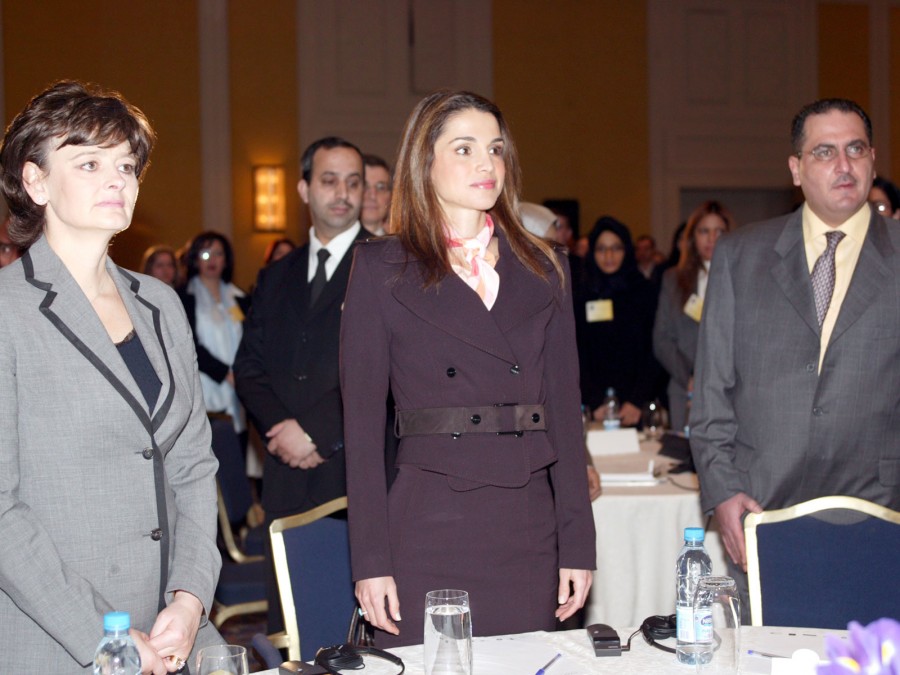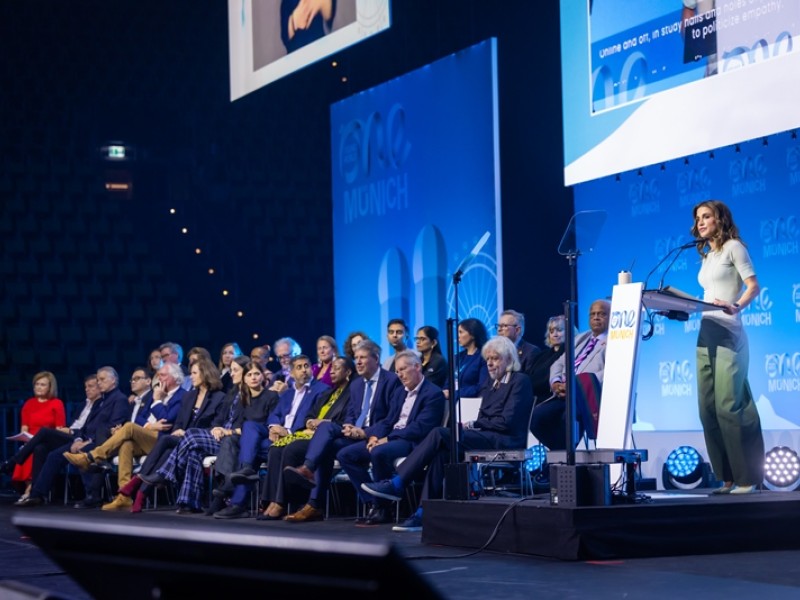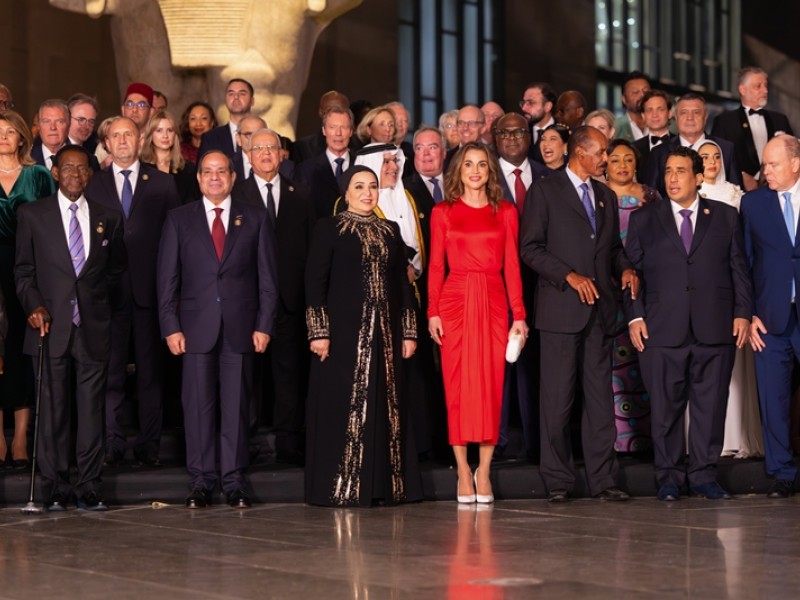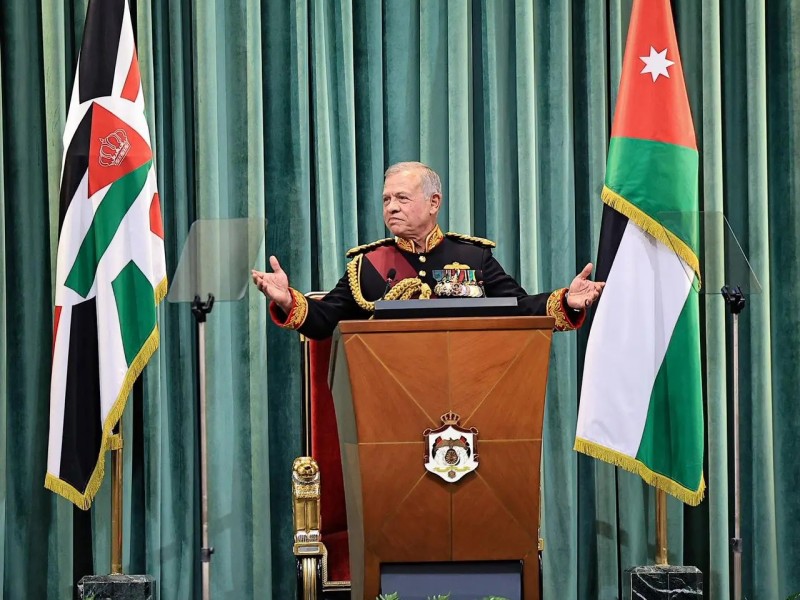Queen Rania attends opening of “Women and the Law” regional workshop

(Office of Her Majesty, Press Department - Amman) Underlining the need to bolster women’s participation in public life, and in an effort to enhance inter-Arab efforts in that regard, Her Majesty Queen Rania Al-Abdullah attended the opening of the workshop “Women and the Law — A regional Dialogue...Supporting Voices of Change.”
Designed to be a follow up to the first Arab Judicial Forum which was held in Bahrain in Sept. 2003 to improve efficiency of judicial institutions in the Middle East, the three-day regional workshop aims to generate discussion among Middle Eastern women in the legal profession on common issues and challenges, raise awareness of pertinent issues affecting women in judicial systems and develop plans for specific collaboration among participants.
Legal experts from 16 Arab countries in addition to participants from the US and the European Union including Mrs. Cherie Blair, wife of British Prime Minister Tony Blair, are taking part in the workshop organized by the United States Middle East Partnership Initiative (MEPI), the American Bar Association, and the Ministry of Justice.
In his opening remarks, Minister of Justice Dr. Salaheddine Al Bashir thanked Queen Rania for her patronage and continuous support. He said holding such workshops in Amman lends further support to inter-Arab women’s efforts aided by the Arab Women’s Summit, currently headed by Queen Rania.
While Jordan has come a long way in the field of human rights and reinforcing the principles of equality, rule of law, and equal opportunity, there is a long road ahead, Bashir noted.
“Initiatives and programs such as those of the National Council of Family Affairs, headed by Queen Rania, have brought about great strides in enhancing women’s role and empowering them to take an active role in the development of society,” he added.
Bashir noted that the government was taking practical steps to empower women in the overall development process and working to amend laws that discriminate against them. He cited the increase in the number of women in decision-making as well as public life positions such as parliamentarians, senators and ministers.
The minister urged judges and lawyers to share their legal experiences with their fellow colleagues from neighboring countries to develop future action plans to enhance their profession.
“Jordan appointed its first female judge in 1996, and now we have 19 serving female judges in Jordan. One was even appointed to the International Criminal Tribunal for Rwanda by the United Nations General Assembly,” Bashir said, adding that there were now 1,050 practicing female lawyers in addition to 6,000 male lawyers registered at the Jordan Bar Association.
Jordan’s Judge Taghrid Hikmat, the first Arab woman to be elected to an international tribunal in June 2003, was also recently named recipient of the Distinguished Arab Woman Award which she will receive from Arab League Secretary General Amr Musa in April.
Also at Monday’s opening session, US Ambassador Edward Ghnehm emphasized that women’s participation was a cornerstone for building prosperous and stable societies.
He added while the road ahead might be hard “every step you take today, no matter how small, will make you closer to your goal tomorrow.” Participants at the workshop include judges, lawyers, academics, deputies, and prosecutors from Algeria, Bahrain, Egypt, Iraq, Kuwait, Lebanon, Morocco, Oman, Palestinian Authority, Qatar, Saudi Arabia, Syria, Tunisia, United Arab Emirates, Yemen and Jordan.
The workshop’s sessions aim to assess the quality of womens’ judicial participation in the countries of the region. By showing best practices and making regional linkages, the workshop will focus on skills training, mentoring, and networking as well as on raising public awareness about women’s legal rights.
Sessions will tap into Women and the Judiciary (comparative presentations on experience in the Arab World and beyond); the role of the legal framework (Civil and Islamic Law); Judicial Development (alternative dispute resolution, case management, judicial training); Human Rights and Equality (incorporating international human rights law into domestic law and best practices for the region).
MEPI was founded to support socio-economic and political reform efforts in the Middle East and champion opportunity for all people of the region, especially women and youth.
The initiative strives to link Arab, US and global private sector businesses, non-governmental organization, civil society elements and government together to develop innovative policies and program to achieve this mission.
The initiative’s programs support region-wide economic and employment growth driven by private sector expansion and entrepreneurship; respect for he rule of law; teaching people the skills necessary for today’s economy and working towards economic, political, and educational systems where women enjoy full and equal opportunities.
Featured
Queen Rania's official website
This website does not support old browsers. To view this website, Please upgrade your browser to IE 9 or greater
Your browser is out of date. It has known security flaws and may not display all features of this and other websites. Learn how to update your browser



